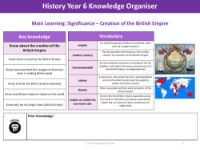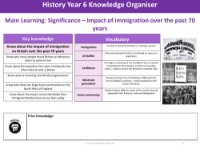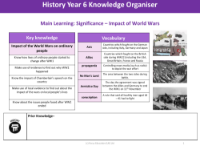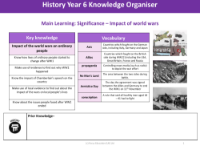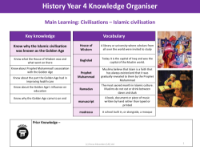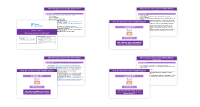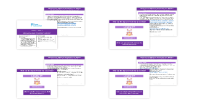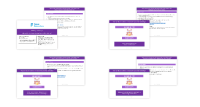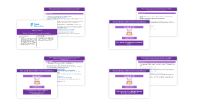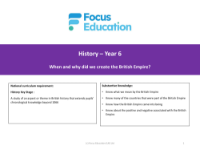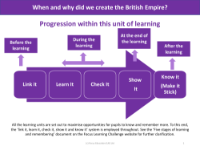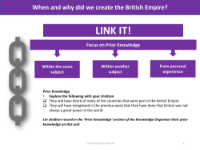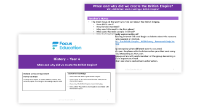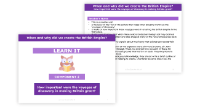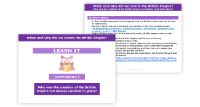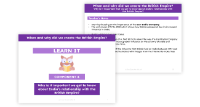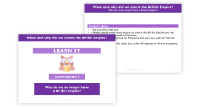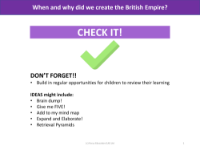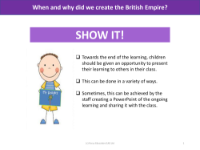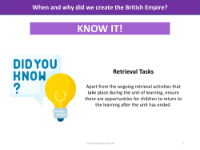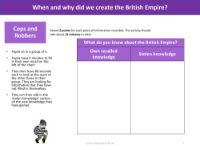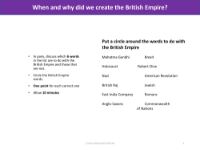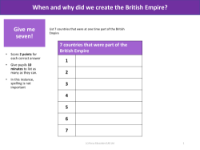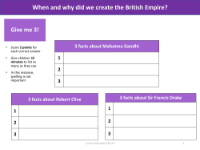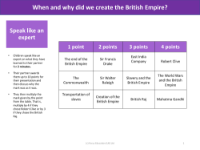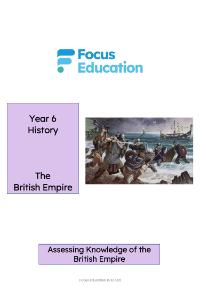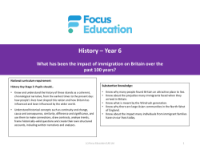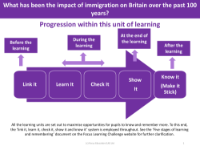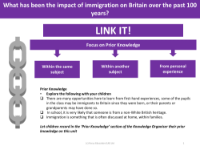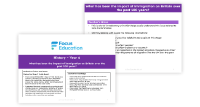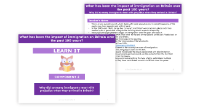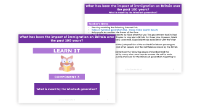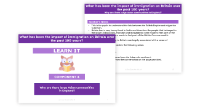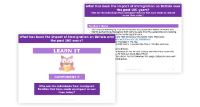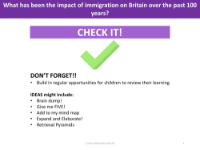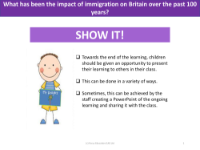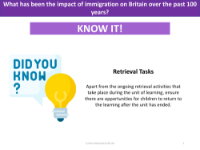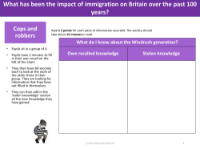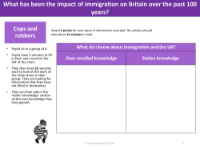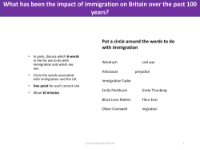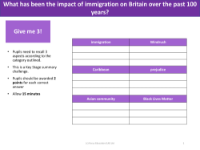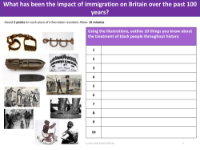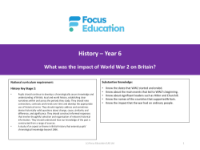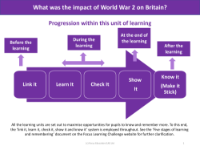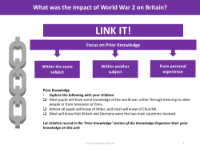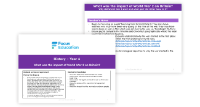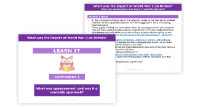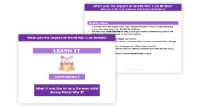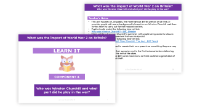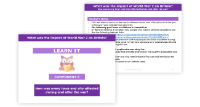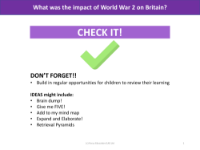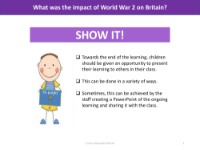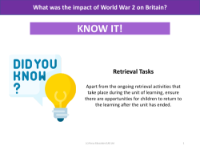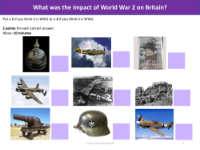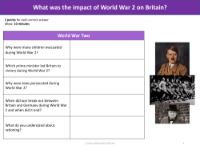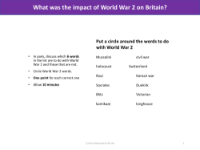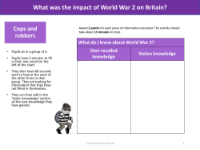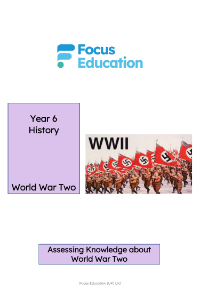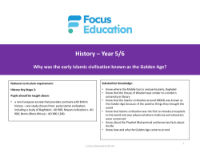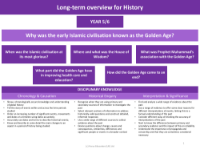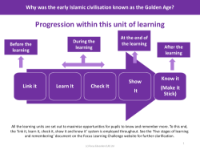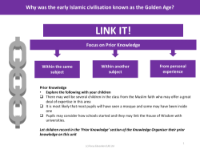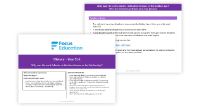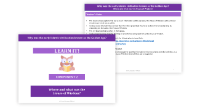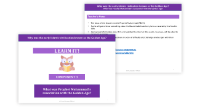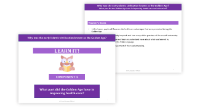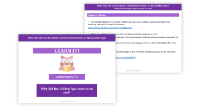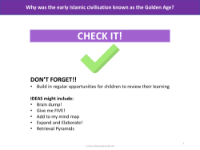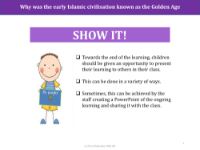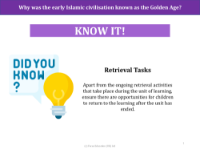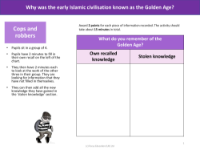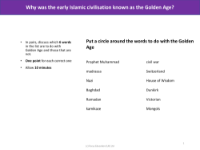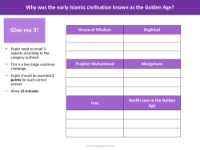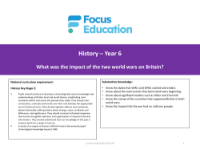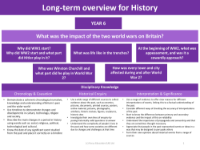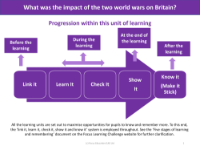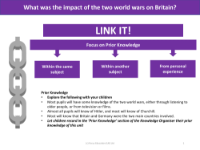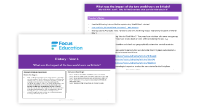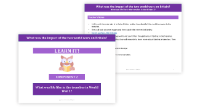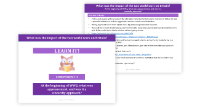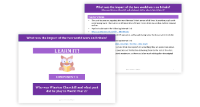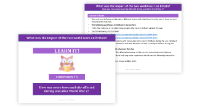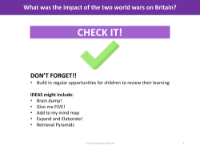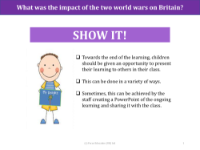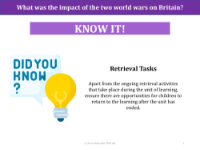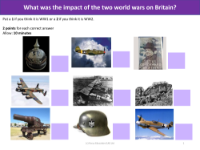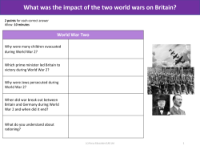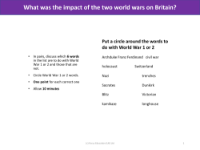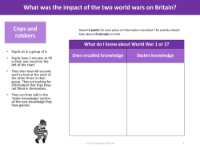History - Year 6 - Focus Education
What does the Year 6 scheme cover?
Focus Education prioritises equipping Year 6 teachers with the essential tools to deliver exceptional History lessons, ensuring remarkable outcomes for pupils. With each lesson focussing around an enquiry-based question, substantive and disciplinary knowledge builds over time to become firmly embedded. This approach not only cultivates a chronological understanding of local, British and world history, but also fosters a lasting appreciation of how our present actions can shape the future.
British Empire
Examine the key individuals and events associated with the British Empire during this unit. Explore the foundational role of the "voyages of discovery" in the creation of the British Empire, focusing on the pioneering sailors who embarked on these crucial expeditions. Understand the historical context of the rivalry between Britain and Spain during this period, which significantly influenced the course of exploration and empire-building. Investigate the motivations, challenges and achievements of notable explorers such as Sir Francis Drake, Sir John Hawkins and Sir Walter Raleigh, who played pivotal roles in shaping Britain's imperial history.
Key questions answered:
- Why did Britain start creating a British Empire?
- How important were the voyages of discovery in making Britain great?
- Why was the creation of the British Empire not always covered in glory?
- Why is it important we get to know about India’s relationship with the British Empire?
- Why do we no longer have a British Empire?
Windrush
In this unit, explore the complex issue of race discrimination and its historical context. Research the changing patterns of migration to the United Kingdom over time, considering the various stages of immigration spanning the past century. Assess the prevalence of prejudice and discrimination in the country, drawing insights from personal experiences and utilising relevant extracts to provide context to these issues. Examine the link between the British Empire and migration to Britain, recognising how historical events, colonial legacies and geopolitical shifts have influenced migration patterns. Understand the social, economic and political factors that have shaped attitudes towards immigrants and minority populations in the United Kingdom.
Key questions answered:
- Why have so many people found Britain an attractive place to come to live?
- Why did so many immigrants meet with prejudice when they arrived in Britain?
- What is meant by the Windrush generation?
- Why are there large Asian communities in the North West of England?
- Who are the individuals from immigrant families that have made an impact on our lives today?
World War 2
Learn about the attempts made by the then prime minister of Britain to find a peaceful solution to Hitler’s aggressive move to invade Czechoslovakia in this unit, and write a non-chronological report as to why the war started in the first place. Listen to the famous speeches and explore differing views on appeasement. Learn how many towns were adversely affected by the war, and how many young and middle-aged men were recruited into the forces and women were conscripted to work in factories.
Key questions answered:
- Why did World War 2 start and what part did Hitler play in it?
- What was appeasement and was it a cowardly approach?
- What it was like to be a German child during World War Two?
- Who was Winston Churchill and what part did he play in the war?
- How was every town and city affected during and after the war?
Islamic Civilisation
Research to find out what was happening in Britain during the time the early Islamic civilisation was at its strongest during this unit. Explore the intellectual achievements of this period, particularly the House of Wisdom, where highly intelligent people gathered to share knowledge. Investigate the significant contributions made to medicine and dentistry during this time and how it laid the foundation for advancements in healthcare. Get to know about Prophet Muhammad’s life and beliefs, understanding why he is revered by the Muslim faith and considered the last 'Messenger of God' in Islam. Focus on the healthcare advantages promoted during the Islamic Golden Age and how Muslim doctors built on previous discoveries to accelerate the growth of medical science. Examine the role of Islamic scholars in preserving and advancing knowledge in various fields, contributing to the overall progress of civilisation during this era.
Key questions answered:
- When was the Islamic civilisation at its most glorious?
- Where and what was the House of Wisdom?
- What was Prophet Muhammad’s association with the Golden Age?
- What part did the Golden Age have in improving health care and education?
- How did the Golden Age come to an end?
World War 1
Get to grips with the impact of the two world wars on Britain during this unit. Use a range of evidence to offer clear reasons for different interpretations of events, linking this to a factual understanding of the past. Find out about trench foot and trench food, and use sources to find out about the conditions in which soldiers fought in. Research background information on Winston Churchill and discuss what made his speeches so special.
Key questions answered:
- Why did WW1 start? Why did WW2 start and what part did Hitler play in it?
- What was life like in the trenches?
- At the beginning of WW2, what was appeasement, and was it a cowardly approach?
- Who was Winston Churchill and what part did he play in World War 2?
- How was every town and city affected during and after World War 2?
What’s included for Year 6 teachers?
- Full Year 6 National Curriculum coverage
- Detailed lesson plans and presentations
- Visual knowledge organisers for each lesson
- Comprehensive assessment materials
- Links to prior and future learning, progression maps & more!
